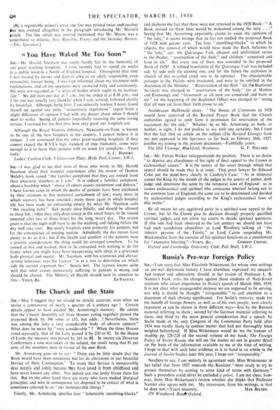Russia's Pre-war Foreign Policy
SIR, —I am sorry that Miss Elizabeth Wiskemann, for whose own writings on pre-war diplomatic history I have elsewhere expressed my unquali- fied respect and admiration, should, in her review of Professor L. B. Namier's book, echo his charges against those students of Nazi-Soviet relations who attach importance to Stalin's speech of March 10th, 1939. It is not clear what propagandist purpose we are supposed to be serving, 'nor why it should be thought " irresponsible " to call attention to a document of such obvious significance. For Stalin's remarks, made for the benefit of foreign Powers, as well as of his own people, were clearly important as can be shown in three different ways—first by the Russian material referring to them ; secomj bfthe German material referring to them, and third by the more general consideration that a speech by Stalin made at the only Congress of the Communist Party held after 1934 was hardly likely to contain matter that had not thoroughly been weighed beforehand. If Miss Wiskemann would do me the honour of reading pp. 226-228 of the second volume of my book, The Foreign Policy of Soviet Russia, she will see the matter set out in greater detail on the basis of the information available to me at the time of writing. I hope to deal with such later evidence as is to hand in an article in the Journal of Soviet Studies later this year, I hope not "irresponsibly."
Needless to say, I am entirely in agreement with Miss Wiskemann in her belief that from 1937 onwards the Russians " were ready to try to protect themselves by coming to some kind of terms with Germany." Such a procedure could never be excluded a priori. I am not clear, how- ever, from Miss Wiskemann's review whether she thinks that Professor Namier also agrees with her. My impression, from his writings, is that






































 Previous page
Previous page